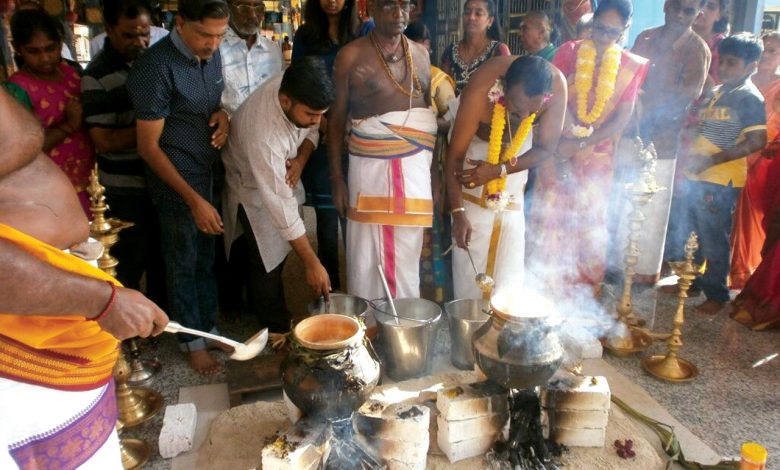

By A. Jeyaraj
Pongal, after all these years of celebration, was discovered to be a religious festival by the Ministry of Education who issued a circular restricting the celebrations in schools. Malaysians were not that gullible and celebrated Pongal as usual. I was working for Brunei LNG for about 20 years and the common phrase was pakai otak or use your brain.
Truth is, Pongal, like all other harvest festivals, celebrated around the world, predates religion. Religions came into being much later.
Pongal is a Harvest Festival celebrated by Tamils throughout the world, regardless of their religious beliefs, on the first day of the Tamil month Thai, which is also the Tamil New Year and falls in mid-January.
Pongal translates to “spilling over” and the festival derives its name from the tradition of boiling rice, milk, ghee and sugar in an earthen pot till it starts overflowing. The overflowing pot symbolises fulfilment.
Pongal is celebrated over four days. The day before Pongal is called Bhogi and on that day all old stuff from the house is discarded and burnt. The first day of Pongal is known as Thai Pongal and the making of pongal takes place in the morning. The second day is dedicated to cattle and called Mattu Pongal or Cow Pongal and the cattle are bathed and decorated and given a day of rest. The third and final day is called Kaanum Pongal or Seeing Pongal and visits are made to relatives and friends’ houses. During ancient days this visit was used for matchmaking for sons and daughters.
Pongal gives an opportunity for children, men and women to don colourful traditional dresses. This is a celebration whereby folk dances and songs are promoted to keep the culture going.
Pongal at Home
Susai Amma, 81, said that she came to Ipoh from India when she was young. She came from a farming village and each family celebrated Pongal on its own. They used rice and other grains grown on their land and prayed for a good harvest in the coming year. Susai said that she used to celebrate Pongal when she arrived here but stopped for quite some time. The family decided to resume celebration this year at their family home in Kampung Simee.
As per tradition, the rice pot is kept below three shoots of sugar cane and while the rice overflowed the family members cheered “pongalo pongal” and prayed. Sugar cane is a must for Pongal. The pongal is then consumed by the family members.
Pongal in Temple
Babu Gurukkal, the priest at Kallumalai Temple who performed the ceremony informed that Sankalpam Poosai or prayer should be done before keeping pongal. This prayer is done with a married couple. The prayer is to request the gods to bless the event and ensure that it goes without any hindrance. This year the couple who participated were R. Jeyasegaran, Secretary, Ipoh Hindu Devasthana Paripalan Sabha.
Babu Kurukkal and Ilango Kurukkal, two priests from the temple prepared the pongal in two big earthen pots. When the milk started to overflow the priest circulated the “Aarathi lamp” around the pot. This is an auspicious ceremony to bless the pongal. After special prayers, the pongal was distributed to the devotees.
At noon annathanam or sacred offering of food was provided for all devotees. The concept of annathanam is that the giver and consumer are blessed.
Pongal in Church
Annakkili Rasiah, President of the cultural group of Our Lady of Lourdes Church in Silibin said that the church has been celebrating Pongal from the early 80s.
This year they organised pongal making and kolam drawing competitions. There were cultural dances like kolaattam (dancing with stick) and mayilaattam (peacock dance). A traditional game called Uri Adithal, where, with the help of a stick, blindfolded participants had to break a clay pot hung up high above their heads was organised. This game attracted the attention of the young and old and many participated. A colouring competition was held for primary school students.
I think our religious experts should determine the religion of Perak Man. Then, Perakians who are descendants of Perak Man can practise their original religion.


